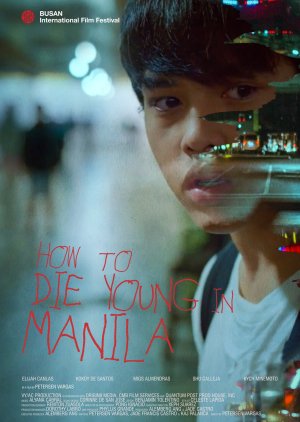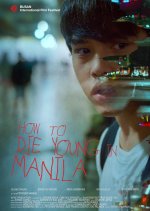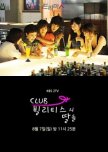- Nederlands
- English
- magyar / magyar nyelv
- עברית / עִבְרִית
- Oorspronkelijke titel: How to Die Young in Manila
- Ook gekend als:
- Scenarioschrijver & regisseur: Petersen Vargas
- Scenarioschrijver: Jade Castro, Kaj Palanca
- Genres: Romance, Drama
Waar je How To Die Young in Manila kunt bekijken
Gratis (sub)
Cast & Credits
- Elijah Canlas[Young boy]Hoofdrol
- Kokoy de Santos[Street hustler] | [Stranger]Hoofdrol
- Miguel Almendras[Street hustler]Bijrol
- Shu Calleja[Street hustler]Bijrol
- Kych Minemoto[Street hustler]Bijrol
beoordelingen

Deze recentie kan spoilers bevatten
A nuanced take on queer intimacy
Symbolic and a macabre--exactly what we're used to from Filipino indie cinema. I liked it; it's a daring and nuanced take on the dangers that young queer people must face when navigating hook-up culture. Unlike their straight peers, who can happily frolic out in the open, the gay dating scene is shrouded in secrecy. It is in dark allies and dingy bathrooms that guys connect with the strangers they've met online-- and just like the city of Manila doesn't bat an eye at the decomposing bodies littering their streets, nobody really seems to care about these young gay men risking their lives in the pursuit of intimacy either.Vond je deze recentie nuttig?

Deze recentie kan spoilers bevatten
A dark, symbolic look at the harm of social ostracizing
I wrote a full analysis of the short, because I found it very fascinating. It was initially jarring, but I felt like everything was very intentional.As far as non-spoilers, the acting was great for the brief amount of time that the actors had. It felt very gritty and authentic, and the setting was intentionally and successfully disturbing. I think the concept was interesting and heartbreaking, but highly effective. As for the music, I don't recall if there even was any, so I can't say much there. It's heavy and not exactly a light watch, so I can't say the rewatch value is high. But it did inspire a lot of thought in me, hence the veritable essay.
I only wish it could be longer, because there was a lot to unpack here. For what it was, and for such a short length, it was impressive. I'm just sad I couldn't see the theme explored more thoroughly, with time for us to love the characters.
It's worth a watch and is very short, so don't read the spoilers below until you've seen it!
SPOILERS:
The entire short is an allegory for the way society rejects gay youth, which leads to them ending up in dangerous situations because they're unable to find love in healthy, safe places. Elijah is a protected, middle class boy with parents who worry about him, entering a dank, dirty area to have sex with a stranger because he's not in a position to court and date the boys at his school, etc. He has to hide who he is, which leads him down a deadly path.
Kokoy plays two roles in this short, which is very significant to the story's climax. Elijah sees four prostitutes, the REAL Kokoy among them. They all die in highly symbolic ways throughout the evening, and the killer is very likely the final, fake Kokoy that Elijah sees in the last shot. Although the killer himself may be more of a metaphor for the way the streets (bad people included) are what kill a lot of these young men, as far as a narrative device, this is a wolf in sheep's clothing scenario for Elijah's character.
In the beginning, it's clear Elijah has only ever spoken to this person online and on the phone, so he has no way of verifying that he is who he says he is. This is reflected again in the bathroom scene, when Elijah hears the phone ring but can't be sure where it's coming from. He's being catfished, but he doesn't know it yet.
All of the boys Elijah sees are already dead, victims of the man who is now using Kokoy's phone and photos to lure Elijah out. This is why in the end there's an exchange where Kokoy clearly doesn't know who Elijah is, and when he turns back to him, Kokoy is also dying.
The final shot is Elijah nervously approaching a person wearing Kokoy's face. The audience still sees the catfish identity, but Elijah is seeing the actual man, the killer. This is why he hesitantly walks toward him before the screen fades to white, as if overpowering the viewer. Elijah's own uncertainty and naivete are his undoing. We can assume he meets the same fate as the other boys this man has trapped.
The fact that the bodies of each victim are out in plain sight is reflective of the same society that cast them out now expressing indifference at their loss. These young people are treated like trash rotting in the street, undesirables, purely because they're males who love other males. The purpose of bringing Elijah in was to show how even sheltered children are exposed to these risks because of how society treats LGBT people.
I can see why people didn't like this, but honestly, I really enjoyed it. I think it's initially confusing, but when you stop and think about it, the pieces are all there. It had a clear and powerful message once you decipher all of the hints and implications.
Vond je deze recentie nuttig?




















































